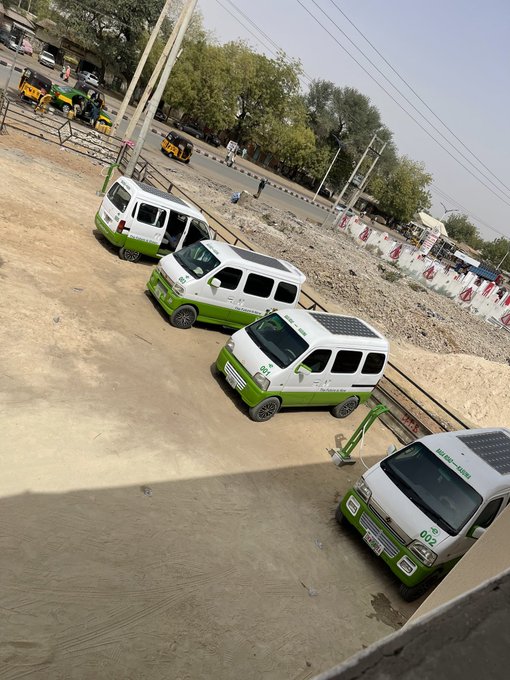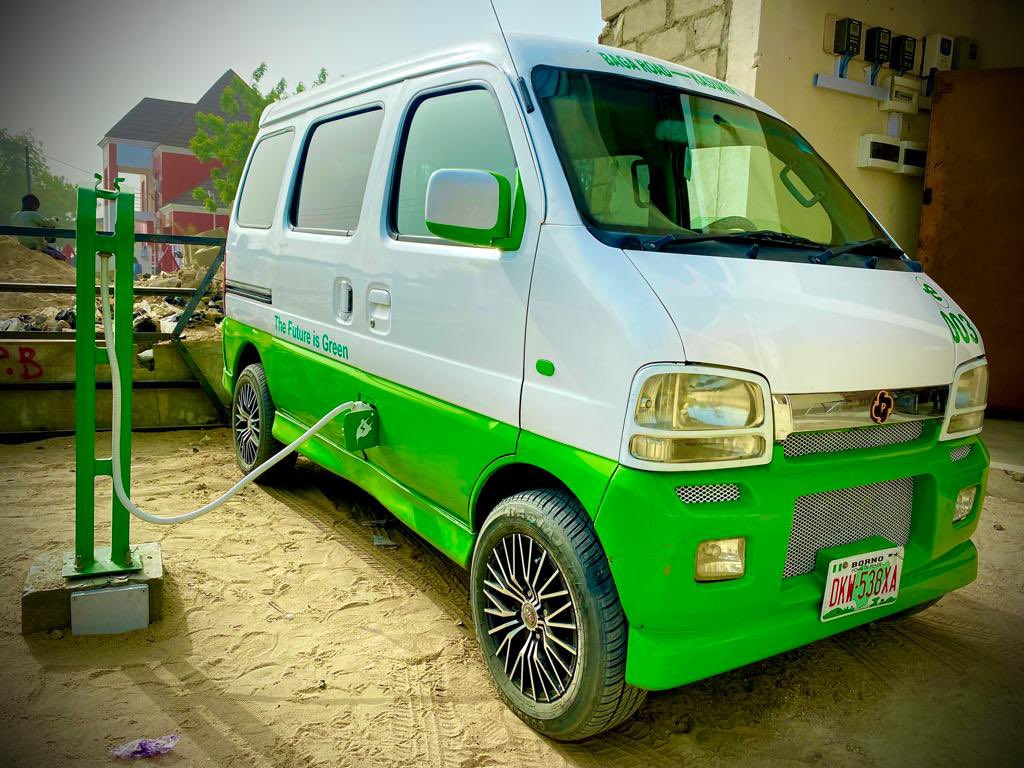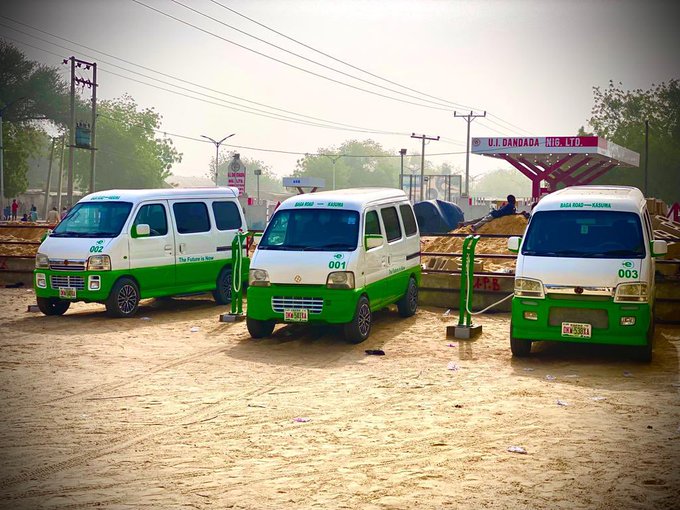We could just say ‘tech’ and end the story like that, knowing that technology has made the 21st century the best time to exist. But, there’s more yet to be done, and Mustapha Gajibo is leading the way with electric vehicles in Borno, Maiduguri, Nigeria.
Mustapha Gajibo, 29, a Borno-based Engineer, and MD of Phoenix Renewables Ltd makes electric vehicles that go 200-km on a full charge after they have been charged for 35 minutes using solar-powered charging platforms.
Mustapha also converts Internal Combustion Engine (ICE)-vehicles into battery-powered ones.

His vehicles, which include electric, solar-powered commercial buses and tricycles, have attracted the attention of Vice President Yemi Osinbajo and the Director-General of the National Automotive Design and Development Council (NADDC) Jelani Aliyu.
He writes on Twitter:
With this piece of technology of ours, we were able maintain the cost of transportation low within our city even though pump price soar across the world. “Endless possibilities”
On March 22, Mustapha also tweeted: “We have moved a step forward from electrifying buses to full design and fabrication of electric buses locally in Maiduguri, Nigeria. When completed, it will be a 12 seater fully air conditioned smart electric bus with a range of 200km on one charge. Endless possibilities…” Gajibo tweeted via his official Twitter handle.
Read also: #YNaija2023: We profile the biggest players in the presidential race
In another tweet, Gajibo says the cars have been put to use in Borno and they have so far carried 21,000 passengers.
Today marks 30 days since our electric city buses commenced operations in Maiduguri Nigeria, we have recorded over 21,000 passengers and we have saved them over N1,100,000 by charging them N50 instead of N100 and also saved the environment 27300g of Carbon monoxide. Green city…
Mustapha Gajibo, April 8
Mustapha’s call to the NADDC
In December, the Director-General, National Automotive Design and Development Council (NADDC), Jelani Aliyu, said that in the next ten years, 50 per cent of the vehicles on Nigerian roads will be electric cars produced or assembled in the country.
According to him, the council is partnering with Jaiz Bank to allow Nigerians buy new electric or gas vehicles on loan and spread payment over five years.
According to Aliyu, the automotive industry thrived in Nigeria for many years but collapsed due to dependence on crude oil.
“…the NADDC got the approval of the federal executive council (FEC) to implement the National Automotive Industry Development Plan, which has five key elements including; helping to promote local production, development of infrastructure, development of standard and market development.
“As a result, we are working on ten years tax holiday for any company that comes up to produce vehicles in the country.
“Also, there is only 10 per cent import duty on vehicles parts imported into the country for assembly here. And when vehicles are assembled here, they attract zero duty and levy.
“Due to these policies, a lot of companies have connected to the Nigerian automobile industry.”
Now, Mustapha Gajibo, also a local producer, has been nominated as a committee member for the national electric vehicle development plan by the NADDC.

The committee’s mandate is to change the narratives of climate change and support the works of local producers like Mustapha Gajibo.

In an interview with Daily Trust, Mustapha says:
I always think of how to solve problems, how to create new things, design and research…economic values are incomparable with a normal gasoline bus. We identified potential problems. At the same time, we came up with electrical minibuses, which can cover 150 kilometres on a single charge. We designed the vehicles to be charged with solar power because this is the future of this country.
Mustapha Gajibo, Daily Trust
Electric vehicles in Nigeria
In June 2021, Yemi Osinbajo test-drove the first locally-assembled electric car, Hyundai Kona, during an exhibition tour of made-in-Nigeria products at the opening ceremony of a five-day Nigeria@60 Expo, held at the Eagle Square, Abuja.
The vehicle, a product of Stallion Motors, was first launched in November 2020 by Babajide Sanwo-Olu, governor of Lagos. Jelani Aliyu had, in February 2021, unveiled the vehicle in Abuja.
The interest in electric vehicles in Nigeria is on the rise.
Metro Africa Express (MAX), a technology company in Lagos, provides mobility solutions in six cities in Nigeria.
In September 2021, Dr Oluleye Adigun, a US-based Nigerian, says he will introduce electric and solar-powered cars into the Nigeria and Africa markets to boost revenue drive and create job opportunities for youths.
Adigun told the News Agency of Nigeria (NAN) in Ibadan that Nigerians would have alternatives to combustion engine cars through the introduction of FLUX vehicles.
But, there are questions – the ones that border on power supply and infrastructure to have electric vehicles working without hassles and breakdowns on the road.
Promise Emmanuel, the Chief Press Secretary to the Deputy Governor of Kogi, Chief Edward Onoja on Saturday said ”As a country, Nigeria can take the lead for Electric Vehicles in Africa. But the market has not kickstarted because of lack of policy and regulation. Nigeria still has key structural issues that prevent the mass adoption of EVs.”
On how the government can create a suitable and holistic policy that will create the enabling environment for electric cars to be produced in the country, Emmanuel said: ”For the government to do this, there are several aspects of the Electric Vehicle Ecosystem and value chain that must be taken into consideration.
”There need to be sufficient and workable charging stations put in place before people buy EVs. Investors also need to know that there is a demand for EVs before they invest in the construction of charging stations across the country. Right now, there are too few EVs in the country to convince investors to key in.
”Another issue that can’t be overlooked is the lack of power supply. According to the US Department of Energy, most EV charging happens at home and not at the designated charging stations. So, how will Nigeria adopt the use of electric vehicles?
”Nigeria intends to adopt the fleet method of adoption of EVs, which involves individuals or businesses buying them and investing in charging stations. We have seen this with a few companies.
”This fleeting idea has been adopted by GIG logistics and delivery company, with its recent launch of an EV charging station in Gbagada, Lagos. This fleeting system is beneficial as it will gradually encourage people to adapt to EVs before bigger investments.
”Nigerians also need answers to how much time and electricity it takes to fully charge these cars. For example, the Kona takes 10 hours to charge and has a power rating of the 7.2-kilowatt-hour. This is a lot depending on the different parts of Nigeria. It can also be cheaper than fueling a petrol-powered car.
”But Nigeria has been known over the years to have a bad track record on electricity. Many areas and states can’t boast of 12 hours of power supply, electricity isn’t constant and also very expensive. How then can Nigerians charge their EVs?
”For this mass adoption to be possible, there is a need for the government and investors can boost renewable energy in form of solar energy and make it affordable for people.”
He added that electric vehicles will be of great benefit to the country.
NADDC is on a path to electric vehicle adoption, and sustainability may be the only question in the next couple of years.











